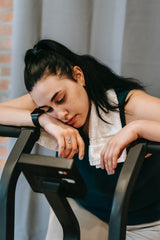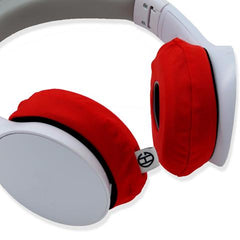Smart Fabric Releases Lemon Fragrance as you Workout
We’ve probably all done the sniff test to check whether yesterday’s gym shirt is good for another go. A lot of us do it post-workout, too, afraid that our intense burst on the static bike has turned us into a walking biohazard.
Sweating can be embarrassing but if you’re worried that you’re not smelling as fresh as you’d like post-workout, then there’s good news:
Researchers at the University of Minho in Portugal have developed a modified cotton fabric that releases a lemon scent when it comes into contact with sweat.
Why Do We Sweat?
We warm up when we workout and sweat is our body’s response to that increase in core temperature. Our brains tell the glands in our skin to start releasing moisture. Sweat is made up of water, salt, urea, protein and ammonia and the process of it evaporating off the surface of our skin helps keep us cool.
Sweating isn’t glamorous and it’s rarely comfortable or pleasant but it is necessary to keep us healthy during a workout.
Why Does Sweat Smell?
Sweat doesn’t actually smell. It’s the bacteria on our skin breaking the sweat down that creates the odour.
What Have the Researchers Actually Developed?
The researchers in Portugal tested two methods.
For the first, they used a protein found in pig’s snouts which can bind to scent molecules. Using a carbohydrate-binding molecule they were able to bind it to cotton.
The second method trapped the scent in liposomes.
"A liposome is a closed, spherical lipid bilayer, which forms an internal cavity capable of carrying aqueous solutions" - Biology.net
The researchers then exposed the cotton to acidic sweat and found that the pig-protein method released a quick burst of citronella. Whilst the fat-based method gave a slower release of lemon scent.
In the paper published in ACS Applied Materials & Interfaces, the researchers wrote that ‘Functional textiles incorporating fragrances could be an effective clothing deodorizing product.’
It’ll be interesting to see if there’s a real-world application for this kind of product and whether it’s something that big brands can market and sell to gym-users.
Cotton is a breathable and lightweight fabric but it retains sweat easily, and so it’s not always ideal for exercising in. One popular alternative is moisture-wicking sportswear but it can be difficult to wash properly and can sometimes smell unpleasant even after multiple trips to the washing machine.
Will EarHugz Release a Fragrance?
EarHugz are sweat-proof headphone covers and they don’t release a fragrance. This is because they move moisture away from the headphone cushion where it can be more easily evaporated before it causes any damage to the cushion. This also prevents unpleasant smells from developing. As EarHugz are machine washable, they’re really easy to keep clean and fresh without the need for citronella.

Why Do I Sweat So Much During Exercise?
Gender: Men tend to sweat more than women because testosterone increases the body’s sweat-response whilst estrogen tends to keep women cooler.
Can I Prevent Sweating During Exercise?
There’s not much that you can do to prevent sweating during exercise. One of the easiest things is to ensure that you’re using good antiperspirant deodorant. If you’re struggling to find one that works for you, then speak to your pharmacist or doctor as they’ll be able to advise on products with a stronger active ingredient.
Wearing a moisture-wicking fabric rather than cotton will help. Moisture-wicking material moves sweat to the surface of the fabric where it can more easily be evaporated. This not only keeps you cool but should make it less obvious that you’re sweating so heavily.
Keep an eye on the humidity. When the humidity is high it means the air is already saturated with moisture so there’s nowhere for your sweat to go. It sits on the skin and is neither cooling nor comfortable. On humid days pick an exercise that’s less physically intensive or take your workout indoors.
Is Sweating the Sign of Good Exercise?
This is a tough one. Sweating can mean that you’re in good shape. Training regular helps the body to adapt and that often means sweating sooner and more profusely so that the level of intensity and effort can be maintained safely. Remember, too, that if you’ve been building endurance for acclimitization, you’ll have been working harder and building on each session so, of course, you’ll be sweating more. You shouldn’t use sweating as a yardstick, however. There are too many individual variables to consider and it’s not helpful or accurate to compare your effort or fitness to someone else’s. If you want to check your progress efficiently, then buy a heart rate monitor.
How Much Do We Sweat During Exercise?
Humans can sweat out between 1 and 3 litres of moisture each hour. That’s incredible (and also a little gross). Having a fabric that disguises sweat could be a useful product for anyone tipping the top end of that number.
Is Sweating Good For Me?
Sweating is good for helping us maintain healthy body temperature. It can also help reduce a person’s likelihood of developing kidney stones because sweating reduces the build-up of calcium and salt in the kidneys. Sweat also has an antibacterial effect and can prevent infections caused by scratches, bites and cuts. It can be good for clear skin, too, as moisture flushes out dirt and toxins hiding in our pores.
Would you buy a shirt that could disguise the smell of sweat? How do you keep cool during your workouts?





